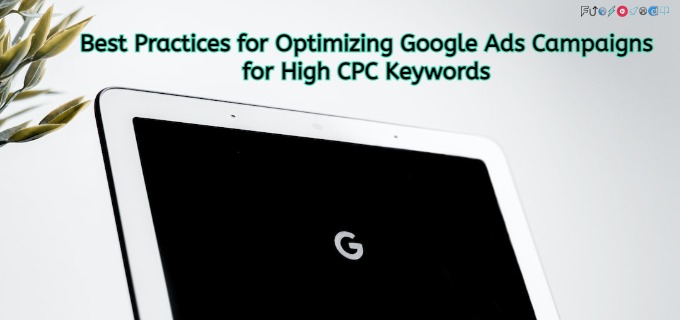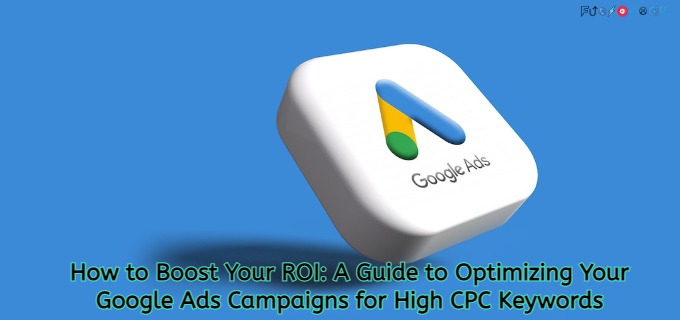In this article you learn that “How to Boost Your ROI” (A Guide to Optimizing Your Google Ads Campaigns for High CPC Keywords).
If you’re running Google Ads campaigns, you may have come across high CPC (cost per click) keywords. These keywords can be more competitive, but they can also offer significant rewards if you optimize your campaigns properly. In this article, we’ll guide you through some best practices for optimizing your Google Ads campaigns for high CPC keywords to boost your ROI.
What are High CPC Keywords?
High CPC keywords are keywords that have a higher cost per click compared to other keywords in your industry. They are often the most competitive and have a higher search volume. These keywords can lead to more traffic and conversions but can also be more expensive. Proper optimization is key to making the most out of your budget.
- How to Optimize Your Google Ads Campaigns for High CPC Keywords
- Highest CPC (cost per click) Paying Countries in the world
Why Optimize for High CPC Keywords?
Optimizing for high CPC keywords can help you reach a larger audience, boost your website traffic, and increase your conversions. While high CPC keywords can be more expensive, they also offer higher rewards when optimized correctly. By following best practices, you can make sure you’re targeting the right audience, getting the most out of your ad spend, and maximizing your ROI.
Best Practices for Optimizing Google Ads Campaigns for High CPC Keywords

- Conduct Keyword Research Start by conducting keyword research to identify high CPC keywords that are relevant to your business. Use tools like Google Ads Keyword Planner, Ahrefs, or SEMrush to research and identify the most relevant and cost-effective high CPC keywords for your business.
- Create Relevant Ads Create relevant ads that align with your high CPC keywords. Make sure your ads highlight the value proposition and offer a clear call-to-action. Use ad copy that is engaging and relevant to your target audience to increase click-through rates and conversions.
- Use Negative Keywords Negative keywords are essential for preventing your ads from showing up for irrelevant searches. By excluding irrelevant keywords, you can ensure that your ads are only shown to users who are more likely to convert, reducing wasted ad spend and improving your ROI.
- Monitor and Adjust Your Bid Strategies It’s important to regularly monitor your campaign data and adjust your bid strategies based on performance. Use tools like Google Ads’ automated bidding or manual bidding options to set bids for each keyword based on your goals and budget. By regularly reviewing your campaign data, you can identify underperforming keywords or ad groups and adjust your bid strategies accordingly.
- Optimize Your Landing Pages Your landing pages should be optimized to align with your high CPC keywords and ads. Make sure your landing pages are engaging, relevant, and provide a clear call-to-action. Ensure your landing pages are optimized for mobile devices and load quickly to avoid high bounce rates.
- Experiment with Ad Variations and Targeting Continuously testing and experimenting with different ad copy, landing pages, and targeting strategies is key to improving your Google Ads campaigns for high CPC keywords. Use A/B testing or multivariate testing to compare different ad variations and landing page designs to identify the most effective combination. Experiment with different targeting options, such as location targeting or device targeting, to see how they impact your performance metrics.
Conclusion
In conclusion, optimizing your Google Ads campaigns for high CPC keywords requires a combination of best practices and continuous experimentation. By regularly monitoring your campaign data and adjusting your strategies based on performance, you can get the most out of your advertising budget and achieve better results from your campaigns.
Remember to use negative keywords, test different ad variations and targeting options, and continually refine your bid strategies to improve your ROI. With these best practices, you’ll be on your way to boosting your ROI and taking your Google Ads campaigns to the next level.
FAQs:
FAQs: How to Boost Your ROI: A Guide to Optimizing Your Google Ads Campaigns for High CPC Keywords
If you’re running a Google Ads campaign, you might have come across high CPC (cost per click) keywords. These keywords are more competitive than others, but they can offer significant rewards if you optimize your campaigns properly. In this guide, we’ll walk you through the best practices for optimizing your Google Ads campaigns for high CPC keywords to boost your ROI.
Q: What are high CPC keywords?
A: High CPC keywords are keywords that have a higher cost per click compared to other keywords in your industry. They are typically more competitive and have higher search volume. Although they may cost more, they can lead to more traffic and conversions when optimized correctly.
Q: Why should you optimize for high CPC keywords?
A: Optimizing for high CPC keywords can help you reach a larger audience, boost your website traffic, and increase your conversions. Although high CPC keywords may be more expensive, they offer higher rewards when optimized correctly. By following best practices, you can ensure that you are targeting the right audience, getting the most out of your ad spend, and maximizing your ROI.
Q: What are the best practices for optimizing Google Ads campaigns for high CPC keywords?
A: The following are the best practices for optimizing your Google Ads campaigns for high CPC keywords:
- Conduct keyword research: Use tools like Google Ads Keyword Planner, Ahrefs, or SEMrush to identify the most relevant and cost-effective high CPC keywords for your business.
- Create relevant ads: Create ads that align with your high CPC keywords. Ensure that your ads highlight your value proposition and offer a clear call-to-action. Use ad copy that is engaging and relevant to your target audience to increase click-through rates and conversions.
- Use negative keywords: Use negative keywords to exclude irrelevant keywords and ensure that your ads are only shown to users who are more likely to convert. This reduces wasted ad spend and improves your ROI.
- Monitor and adjust your bid strategies: Regularly monitor your campaign data and adjust your bid strategies based on performance. Use tools like Google Ads’ automated bidding or manual bidding options to set bids for each keyword based on your goals and budget.
- Optimize your landing pages: Optimize your landing pages to align with your high CPC keywords and ads. Ensure that your landing pages are engaging, relevant, and provide a clear call-to-action. Optimize your landing pages for mobile devices and ensure that they load quickly to avoid high bounce rates.
- Experiment with ad variations and targeting: Continuously test and experiment with different ad copy, landing pages, and targeting strategies to improve your Google Ads campaigns for high CPC keywords. Use A/B testing or multivariate testing to compare different ad variations and landing page designs to identify the most effective combination. Experiment with different targeting options, such as location targeting or device targeting, to see how they impact your performance metrics.
Q: What should I keep in mind when optimizing Google Ads campaigns for high CPC keywords?
A: Keep in mind the following when optimizing your Google Ads campaigns for high CPC keywords:
- Regularly monitor your campaign data and adjust your strategies based on performance
- Use negative keywords to exclude irrelevant searches
- Continuously test and experiment with different ad copy, landing pages, and targeting strategies
- Optimize your landing pages for mobile devices and ensure that they load quickly
- Set bids for each keyword based on your goals and budget
In conclusion, optimizing your Google Ads campaigns for high CPC keywords requires a combination of best practices and continuous experimentation.

